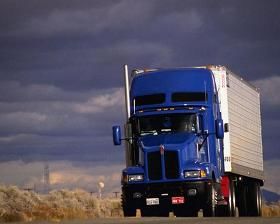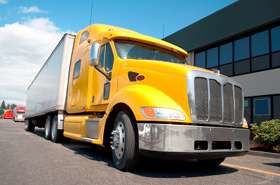Swift Reefer Vs Dry Van. Opinions Please
Topic 12872 | Page 1

When I drove for Swift I generally dealt with dry van , but every once in a while they'd throw a reefer on me. And in my experience, reefer was really annoying. You'd often have multiple stops in one trailer, and multiple temp zones within that trailer, so getting unloaded means digging through layers of product since stop #1 could have stuff in zones A, B, and C. Have fun with that. I'll stick with dry van.
Dry Van:
A trailer or truck that that requires no special attention, such as refrigeration, that hauls regular palletted, boxed, or floor-loaded freight. The most common type of trailer in trucking.Reefer:
A refrigerated trailer.

When I drove for Swift I generally dealt with dry van , but every once in a while they'd throw a reefer on me. And in my experience, reefer was really annoying. You'd often have multiple stops in one trailer, and multiple temp zones within that trailer, so getting unloaded means digging through layers of product since stop #1 could have stuff in zones A, B, and C. Have fun with that. I'll stick with dry van.
Thanks for the info.
Dry Van:
A trailer or truck that that requires no special attention, such as refrigeration, that hauls regular palletted, boxed, or floor-loaded freight. The most common type of trailer in trucking.Reefer:
A refrigerated trailer.

I have done both dry and reefer. With swift. I find dry is mostly drops and Hooks. With loads going about 3 to 6 hundred miles on average. Reefer dose have more stops on it but we get paid stop pay. My loads average about 1000+ miles. I have found I get more miles per week reefer then I do dry van. Reefer is more otr , and dry seems to be more reginal. Depends what you want. I like reefer because even now in the slow time of year I am still running my 70 out.
OTR:
Over The Road
OTR driving normally means you'll be hauling freight to various customers throughout your company's hauling region. It often entails being gone from home for two to three weeks at a time.
Dry Van:
A trailer or truck that that requires no special attention, such as refrigeration, that hauls regular palletted, boxed, or floor-loaded freight. The most common type of trailer in trucking.Reefer:
A refrigerated trailer.
Murderspolywog points out:
Reefer does have more stops on it but we get paid stop pay.
Remember, you get paid stop pay because you're not rolling. So one Stop Pay may be worth 40 miles in the interstate. It's more of a wash than extra income.
Interstate:
Commercial trade, business, movement of goods or money, or transportation from one state to another, regulated by the Federal Department Of Transportation (DOT).
Reefer:
A refrigerated trailer.

I have done both dry and reefer. With swift. I find dry is mostly drops and Hooks. With loads going about 3 to 6 hundred miles on average. Reefer dose have more stops on it but we get paid stop pay. My loads average about 1000+ miles. I have found I get more miles per week reefer then I do dry van. Reefer is more otr , and dry seems to be more reginal. Depends what you want. I like reefer because even now in the slow time of year I am still running my 70 out.
Sweeet. That's what I like to hear lol.
OTR:
Over The Road
OTR driving normally means you'll be hauling freight to various customers throughout your company's hauling region. It often entails being gone from home for two to three weeks at a time.
Dry Van:
A trailer or truck that that requires no special attention, such as refrigeration, that hauls regular palletted, boxed, or floor-loaded freight. The most common type of trailer in trucking.Reefer:
A refrigerated trailer.

Murderspolywog points out:
Reefer does have more stops on it but we get paid stop pay.
Remember, you get paid stop pay because you're not rolling. So one Stop Pay may be worth 40 miles in the interstate. It's more of a wash than extra income.
Not for me its not I have made 11 stops in the last week not one of the taking more then 30 min to-do. Now if I had stops at Walmart DC or Costco ya you don't make money doing that.
Interstate:
Commercial trade, business, movement of goods or money, or transportation from one state to another, regulated by the Federal Department Of Transportation (DOT).
Reefer:
A refrigerated trailer.
New Reply:
New! Check out our help videos for a better understanding of our forum features

















Preview:








 TT On Facebook
TT On Facebook
Finally got my cdl after 3 weeks of being here at the Swift company sponsored training & start orientation on Monday.
I have one question though; what are the pros & cons for SWIFT reefer & dry van divisions? I want to go into the right one for my situation. And what I would fit into best
CDL:
Commercial Driver's License (CDL)
A CDL is required to drive any of the following vehicles:
Dry Van:
A trailer or truck that that requires no special attention, such as refrigeration, that hauls regular palletted, boxed, or floor-loaded freight. The most common type of trailer in trucking.Company Sponsored Training:
A Company-Sponsored Training Program is a school that is owned and operated by a trucking company.
The schooling often requires little or no money up front. Instead of paying up-front tuition you will sign an agreement to work for the company for a specified amount of time after graduation, usually around a year, at a slightly lower rate of pay in order to pay for the training.
If you choose to quit working for the company before your year is up, they will normally require you to pay back a prorated amount of money for the schooling. The amount you pay back will be comparable to what you would have paid if you went to an independently owned school.
Company-sponsored training can be an excellent way to get your career underway if you can't afford the tuition up front for private schooling.
Reefer:
A refrigerated trailer.